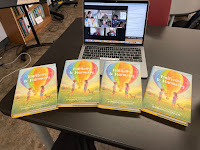How did you come to know Bea?
For all of my books, I have always come to know my characters through their voices. Before I start working on their story, I listen to the way they sound and any little phrases they might say. When I first heard Bea she was saying, "I got this." I could tell through her voice that she was independent, strong, and perhaps a bit competitive. From there, I started to piece together her story.
What do you think is her most admirable quality?
I love Bea's sense of justice. She knows, deep in her, through the strength of her mom and grandma, what is wrong and what's right, what is fair, and what needs to change. And even better, she has the strength and persistence to hold people accountable and to fight for what's right. I also admire that throughout the book Bea starts to recognize unfairness in her own outlook. She learns a lot from the character A, and from the girls on her team.
What do you think Bea can offer to other children that are experiencing similar situations to what she went through?
For all my books I hope that my characters and stories can make readers feel less alone. In this book, Bea is going through a big change to her family. It's hard and new and she isn't happy about it. I hope readers can attach their heart to hers as she navigates the newness. I hope also that readers can feel, through Bea, how hard it is when unfairness is pointed at you. While I hope that no child has a coach, teacher, or anything like Principal Meesley, they do exist, and their toxicity spreads. Bea learns that in order to rise up against that kind of injustice she has to team up with other strong, persistent people.
Do you and Bea share any similarities?
For all of my books, I reflect back to my own childhood and some of the big emotions I remember feeling then. Each book is then powered by that seed emotion. For BEA IS FOR BLENDED it was a moment when the boys’ soccer team at my school dressed up like girls for team spirit. They wore sports bras over their jerseys, stuck their hair in little ponytails all over their heads, smeared terrible lipstick across their mouths, and flitted around the halls pretending they had broken a nail. I remember feeling angry and humiliated, but I also remember feeling the pressure to laugh along with the boys, because the “cool” girls were the ones who could take a joke. I had a non-reaction then. I went about my day not laughing along with them, but also not confronting them, and I remember my silence feeling so wrong. But now I have BEA and this book is, in part, my reaction to that behavior. Throughout the writing of the book, I stayed true to that seed emotion, and built the story from there.
What was the hardest scene to write about her?
The hardest scene was when she sees the horrible notes on Principal Meesley's clipboard in Maximilian's handwriting and she realizes that even really good people can do the wrong thing by something as simple as staying silent and following along.
Who do you think was her biggest supporter and why?
Bea is so lucky to have so many supporters. Her mom, grandma, and "aunt" Tam have been there for her from the beginning, and her two teachers, Ms. Blaise and Ms. Kravitz are just so present and so excellent. And, of course, her soccer team.
Why do you think even in the year 2021, girls in our society are still looked at different than boys; especially when it comes to sports?
This is a big issue, and I think it's complicated and overwhelming, but from what I've felt as a girl growing up, and from what I've witnessed as a middle school teacher, a lot of it lies in our language and the little behaviors we let slide. In the book, Principal Meesley tells the boys' soccer team, "If you want to win games you can't shy off the ball like a couple of little girls," and the boys' team dresses up like the girls' soccer team for team spirit, prancing along the halls pretending to be air-heady and weak, and Principal Meesley calls it a misunderstanding, that it was all in good fun. In my opinion boys are too often not equipped with the strength to tell other boys to quit it, that they aren't funny. However, there is hope in the character of Bryce. I hope that readers will see his strength and, by the end of the book, be cheering on his actions, along with the girls' soccer team.
What do you think Bea is doing as the present time?
Getting ready for next season!






















